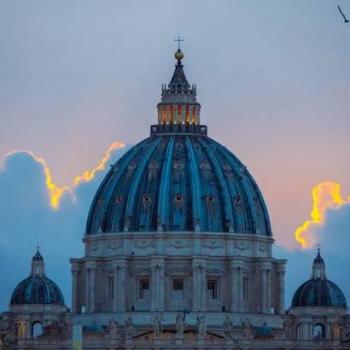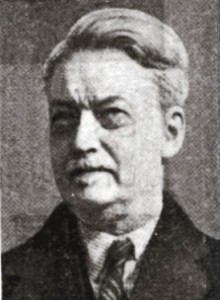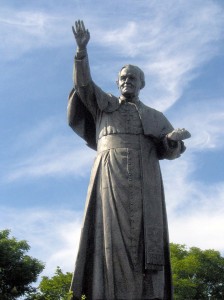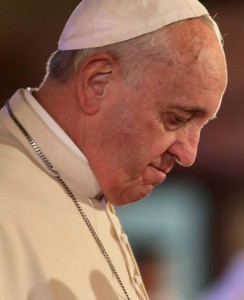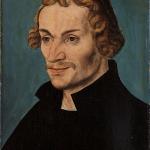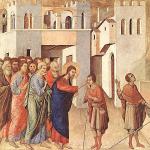Pope Francis seems to be a subject of unending fascination. Some of my intellectual evangelical friends are saying that Francis may be the most Christlike man since Jesus. Most of my Catholic intellectual friends (two-thirds of them Pope John Paul II Catholics) love his common touch, and see a strong, farsighted intellect underneath his folksiness.
My colleague at Ave Maria University, Economics and Family Professor Catherine Pakaluk, has seen that Francis may have the clearest insight of any recent pope (or theologian) into just how empty so many contemporary minds are of any elementary sense of godliness, or immortality, let alone of the nature of God Himself. Professor Pakaluk may well be right on this.
Pope Francis grasps that every so often he will be granted ten or twenty seconds of television here or there. Well, in a godless age in Europe and among the most influential elites in America, if you want to call attention to the Creator, Endower of rights, and His Jesus on the cross, how would you use your few seconds? On minor subjects, or on the one big one: God’s infinite love and mercy turned toward humankind.
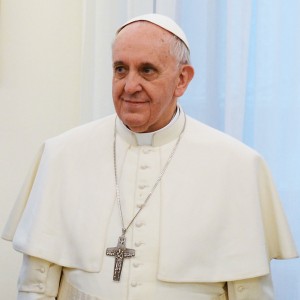
No sin you commit, he says, will ever be too great for God to forgive. In such a terrible century that the world has just suffered, this poor earth badly needs mercy. What an age we have experienced! How many bodies we have seen thrown around like bags of sand. People everywhere need to know that they are still loved by their Maker, and cherished. And we are all forgiven (if we ask), even for our ugliest sins.
* * *
In a brilliant recent blog post in The New York Times, Ross Douthat commented on the three kinds of conservative Catholic intellectual leaders in America whom he thought most significant: (1) those whose interests seemed predominantly doctrinal, (2) economic, and (3) liturgical (the Tridentine Mass, etc.). At one point, Douthat listed democratic capitalism, economic conservatives, and libertarians under the “economic” heading. If I could take a moment here, it’s important to distinguish the vision of democratic capitalism from that of libertarianism.
Libertarians tend to stress the “free market.” But democratic capitalists note that the cause of wealth is not markets – markets are millennia old, but have classically been quite static for centuries. What brings wealth is invention, discovery, creativity – as Abraham Lincoln stressed in his Springfield Address and Wisconsin State Fair address in 1859.
Altogether, democratic capitalism envisions the free and virtuous society as a three-sided system: economic, political, and moral/cultural. One of the best papal statements of this three-sidedness is to be found in paragraph 42 of John Paul II’s 1991 Letter to the World, Centesimus Annus (“the hundredth year”). Note how carefully John Paul II lays out the three parts of the system he insisted the Church should support. Note how clearly states that he will not support any system lacking even one of these three sides.
Can it perhaps be said that, after the failure of Communism, capitalism is the victorious social system, and that capitalism should be the goal of the countries now making efforts to rebuild their economy and society? Is this the model which ought to be proposed to the countries of the Third World which are searching for the path to true economic and civil progress?
The answer is obviously complex. If by “capitalism” is meant [i] an economic system which recognizes the fundamental and positive role of business, the market, private property and the resulting responsibility for the means of production, as well as free human creativity in the economic sector, then the answer is certainly in the affirmative, even though it would perhaps be more appropriate to speak of a “business economy”, “market economy” or simply “free economy”. But if by “capitalism” is meant a system in which freedom in the economic sector is not [ii] circumscribed within a strong juridical framework which places it at the service of human freedom in its totality, and which sees it as a particular aspect of that freedom, [iii] the core of which is ethical and religious, then the reply is certainly negative. (CA, 42)
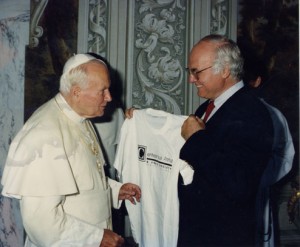
In the anthropology of the church, Catholic social thought sees the human being as a three-dimensioned being. Each human is at once a political animal, an economic animal, and a moral/religious animal (under law). To miss one of these dimensions is to underestimate human richness and complexity. It is to limit humans to less than their full human calling.
In addition to pointing to this three-sided ideal, Pope John Paul II showed his hard-headed realism when he recalled to mind potential evil developments in such an organism – evils that have occurred in the past and could come back again, if we are not vigilant.
The Marxist solution has failed, but the realities of marginalization and exploitation remain in the world, especially the Third World, as does the reality of human alienation, especially in the more advanced countries. Against these phenomena the Church strongly raises her voice. Vast multitudes are still living in conditions of great material and moral poverty. The collapse of the Communist system in so many countries certainly removes an obstacle to facing these problems in an appropriate and realistic way, but it is not enough to bring about their solution. Indeed, there is a risk that a radical capitalistic ideology could spread which refuses even to consider these problems, in the a priori belief that any attempt to solve them is doomed to failure, and which blindly entrusts their solution to the free development of market forces. (CA, 42)
From the perspective of Latin America, Pope Francis has seen more than enough of such deformation – and in much of the rest of the world too. So he does not flinch from seeing many corruptions eating away at the three-sided ideal.
With every year that passes, Francis seems to concentrate more on the theme which Pope John Paul II opened up, that of the “moral ecology” or “human ecology” of diverse cultures. The moral and cultural dimension.
In all cultures, toxic energies are always at work. In some, the toxicity is so great that it chokes the free development of a basic prosperity, creativity, and even daily virtues. It cripples far too many human beings.
* * *
I make my own this rich and complex view of both Pope John Paul II and Pope Francis. I am happy with it. It is in the direction of my own lifework.





